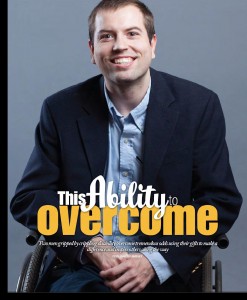Guest Blog by Jamie Sagona – Self-Advocate and friend.
I came across a New York Times article, which led me to a Huffington Post article,
which led me to a Tedx Talk video that blew my mind. It inspired my to do a large
amount of research into medical cannabis and its use for the treatment of seizures
(among other things). It has been a long time since any treatment for epilepsy or any
medical conditions for that matter has gotten me so excited or given me such hope.
One of the more cutting edge treatments gaining notoriety for treating seizures,
even the most severe seizures in children, is not what you might expect. It’s
medical cannabis. A specially derived extract from a plant that has been bred to
have no psychoactive effects, but more analgesic and anti-inflammatory qualities.
It has essential no tetrahydrocannabinol (THC), the psychoactive element found
in cannabis, and it has a high concentration of the non-psychoactive element
cannabidiol (CBD).
So far, there have been no reported negative side effects from taking medical
cannabis. Pharmaceutical treatments for seizures often cause one if not several of
the following: weight gain, fatigue, kidney damage, liver damage, depression, and
cognitive processing problems, among other problems.
A non-profit organization in Colorado called Realm of Caring developed this special
strain of medical cannabis and distributes it to children and adults with various
medical conditions, including epilepsy.
Children that were taking numerous pharmaceuticals and still having hundreds of
seizures a week are now seizure free or virtually seizure free after just one dose of
this cannabis extract. Not only are they seizure free, their cognitive and physical
development has rapidly improved as well. Research currently being conducted
indicates that this improvement my not only be a result of the lack of seizures, but
also due to a property of the medical cannabis.
The irony is that as far back as 1949, research conducted in the United States
showed that cannabis a good treatment for seizures. I am on a quest to learn more
about medical cannabis and its effect on seizures. What I have learned is just
the starting point for me. More research is being done every day internationally
to discover the medical properties and uses for medical cannabis. Luckily,
everyday more information comes out and more formal research studies are being
implemented.
I think it is not only important for me to share research regarding cannabis as a
treatment for epilepsy, but also as it relates to treatment for medical conditions
such as Alzheimer’s, Arthritis, Anxiety, Glaucoma, Depression, Multiple Sclerosis,
Cancer, Chronic Pain, PTSD, Parkinson’s, Migraines, Nausea, Tourette’s Syndrome,
HIV/AIDS, Hepatitis C, and Crohn’s Disease. And these are just a few of the medical
conditions that we know of so far. Pass it on.
http://www.huffingtonpost.com/2013/10/21/medical-marijuana-pediatric-
epilepsy_n_4137260.html


